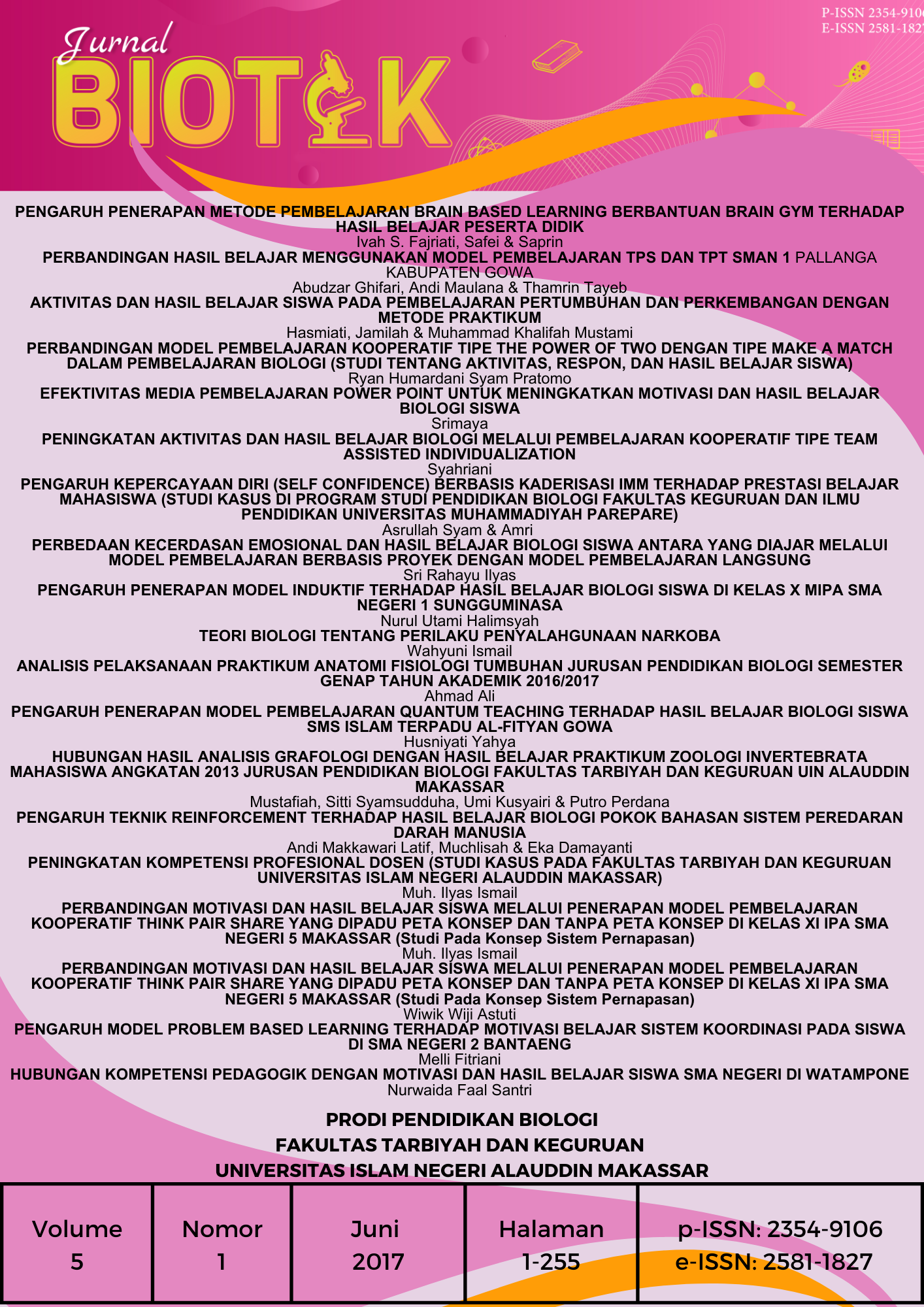PERBEDAAN KECERDASAN EMOSIONAL DAN HASIL BELAJAR BIOLOGI SISWA ANTARA YANG DIAJAR MELALUI MODEL PEMBELAJARAN BERBASIS PROYEK DENGAN MODEL PEMBELAJARAN LANGSUNG
Abstract
The study aims at axamining the differences of emotional intelligence and students learning result on Biology subject between the ones who taught by employing Project-based learning model on environmental pollution lesson material in SMAN 5 Pinrang. The study is a quasi-experimental research with pretes-posttest only non-equivalen control group design. Sample was taken by employing random sampling technique, which obtained grade X IPA1 as the experiment class and grade X IPA2 as the contol class. Data were collected by using pretest and posttest of emotional intelligence and students learning result instrument. Data were analyzed using t-test. The result of the study revealed that 1) Students emotional intelligence taught by employing project-based learning model were different significantly between the ones taught by employing direct learning model with the mean 112,34 and 107,38 respectively, 2) Student learning result on Biology subject were different significantly between the ones taught by employing project-based learning model and direct learning model with the mean 89,19 and 86,09 respectively.
Downloads
References
Amanda, N.W.Y. (2014). Pengaruh Model Pembelajaran Berbasis Proyek terhadap Hasil Belajar IPA Ditinjau dari Self Efficacy Siswa. e-Journal Program Pascasarjana Universitas Pendidikan Ganesha, voleme 4.
Artini, Muderawan dan Karyasa. (2013). Pengaruh Model Pembelajaran Berbasis Proyek Terhadap Kecerdasan Emosional Siswa. e-Journal Program Pascasarjana Universitas Pendidikan Ganesha, Volume 3.
Darmansyah. (2011). Strategi Pembelajaran Menyenangkan dengan Humor. Bumi Aksara. Jakarta.
Daud, Firdaus. (2012). Pengaruh Kecerdasan Emosional (EQ) dan Motivasi Belajar terhadap Hasil Belajar Biologi Siswa SMA 3 Negeri Kota Palopo. Jurnal pendidikan dan pembelajaran, Volume 19, Nomor 2.
Goleman, Danile. (2000). Emotional Intelligence (Terjemahan). Jakarta: PT. Gramedia Pustaka Utama.
Karina, N.K.D. (2014). Pengaruh Model Pembelajaran Berbasis Proyek Terhadap Kemampuan Pemecahan Masalah dan Kecerdasan Emosional Siswa SMP. e-Journal Program Pascasarjana Universitas Pendidikan Ganesha, Volume 4.
Nur, M., Wikandari, P.R. (2000). Pengajaran Berpusat kepada Siswa dan Pendekatan Konstruktivis dalam Pengajaran. Surabaya: Program Pascasarjana IKIP Surabaya.
Nurnaningsih. (2011). Bimbingan Kelompok untuk Meningkatkan Kecerdasan Emosional Siswa. ISSN 1412-565X. Edisi Khusus No.1.
Patton, Patricia. (2002). EQ-Pengembangan Sukses Lebih Bermakna. Bandung: PT. Mitra Publisher.
Purbalaksmi. (2013). Pengaruh Model Pembelajaran Berbasis Proyek terhadap Kemampuan Berfikir Kreatif dan Hasil Belajar Seni Rupa. e-Journal Program Pascasarjana Universitas Pendidikan Ganesha, Volume 4.
Rahmawati, Dini. (2011). Pengaruh Model Pembelajaran Berbasis Proyek terhadap Hasil Belajar Fisika Siswa. Skripsi. Jakarta: Program Studi Pendidikan Fisika.
Rais, Muh. (2010). Project-Based Learning: Inovasi Pembelajaran yang Berorientasi Soft Skill. Makalah disajikan dalam Seminar Nasional, diselenggarakan oleh Program Studi Pendidikan Teknologi dan Kejuruan, Tanggal 11 Desember.
Sanjaya, Wina. (2007). Startegi Pembelajaran Berorientasi Proses Pendidikan. Jakarta: Kencana.
Siwa, I.W. Muderawan dan I N. Tika. (2013). Pengaruh Bembelajaran Berbasis Proyek dalam Pembelajaran Kimia terhadap Keterampilan Proses Sains Ditinjau dari Gaya Kognitif Siswa. e-Journal Program Pascasarjana Universitas Pendidikan Ganesha, Volume 3.
Sopah, J. (2000). Pengaruh Model Pembelajaran dan Motivasi Berprestasi terhadap Hasil Belajar. Jurnal Pendidikan dan Kebudayaan, Jilid 1, No.22.
Trianto. (2007). Model-Model Pembelajaran Inovatif Berorientasi Konstruktivisme. Jakarta: Prestasi Pustaka Publisher.
Authors who publish with Jurnal Biotek agree to the following terms: Authors retain the copyright and grant Universitas Islam Negeri Alauddin Makassar right of first publication with the work simultaneously licensed under a Creative Commons Attribution License (CC BY-SA 4.0) that allows others to share (copy and redistribute the material in any medium or format) and adapt (remix, transform, and build upon the material) the work for any purpose, even commercially with an acknowledgement of the work's authorship and initial publication in Universitas Islam Negeri Alauddin Makassar. Authors are able to enter into separate, additional contractual arrangements for the non-exclusive distribution of the journal's published version of the work (e.g., post it to an institutional repository or publish it in a book), with an acknowledgement of its initial publication in Universitas Islam Negeri Alauddin Makassar. Authors are permitted and encouraged to post their work online (e.g., in institutional repositories or on their website) prior to and during the submission process, as it can lead to productive exchanges, as well as earlier and greater citation of published work (See The Effect of Open Access).

This work is licensed under a Creative Commons Attribution-ShareAlike 4.0 International License.



